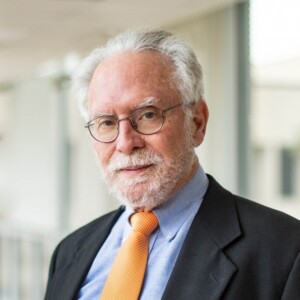Episodes

Tuesday Sep 12, 2023
Tuesday Sep 12, 2023
One role-playing game changed the way I think, or confirmed the way I think—now I don’t know which.
It was Mage: The Ascension. The tabletop role-playing game had players take on the roles of modern mages. The difference was, in previous RPGs, mages are usually spell-casting wizards. In Mage, magic works by imposing will upon the world: A mage wants something to happen. They try to learn how to do things like that (use fire, use time, use space between things, use death), and then they try to force their will on the world. If they succeed without irritating the world (which is a function of other human beings’ belief about how things work), they succeed in their magic. If they don’t, or they’re too obnoxiously obvious about their magic, they fail or succeed … and strange supernatural consequences may happen to them.
Anyway, one of my best friends, James, used to spend hours with me chatting about this world and its ideas.
Well, I saw this book sitting on my bookshelf, and I thought: Who made this thing?
Sam Chupp’s name was associated with the game. He wasn’t the mastermind behind it all, but he was a key writer for a few years with the game’s publisher, White Wolf, and he takes us through a journey in this podcast that covers RPGs, White Wolf, writing, the business of writing, and the pain of workplace burnout, then healing, imagination, and art. We also find out about a game he’s close to releasing himself …
What does that all mean? That means Chupp’s story turned out to be even more interesting to me than anything I could have learned about the Mage game from him.
For those not well-versed in tabletop role-playing games, especially White Wolf, there may be some “What the hell are you saying?” moments. But don’t give up. Let those weird moments of jargon float by and go deep again. Chupp and I will always dance to another topic, and you’ll catch the train of thought again.
Further research:
The deepest dive into Chupp’s past and current work is his Linktree here.
Buy Sam Chupp Media role-playing game offerings on DriveThruRPG.com at this link.
Listen to regular episodes of Chupp’s podcast on his website here.
An old-fashioned website of Chupp’s from years ago appears here. It’s flavorful, fanciful, vulnerable and sweet.

Wednesday Sep 06, 2023
Wednesday Sep 06, 2023
Pet owners complain about the rising cost of veterinary prices. What’s to blame?
This is a special bonus episode of What People Do that I've produced as a part of sponsored content for Animal Health Digest, a premier content curation service collecting and commenting on actionable information for people working in animal health.
I talk with Dr. Jennifer Sperry about the rising cost of veterinary care. Pet owners often say they’re shocked and unprepared for the bill when they visit their local veterinary hospital. How can they cope? And what should they know about why costs are rising?
Dr. Sperry is a veterinarian and a veterinary advisor at Independence Pet Group. IPG has several pet insurance brands specifically designed to help manage the risk of costs for services at veterinary practices.
We discuss an opinion piece she has drafted with her perspective on five reasons for these increasing costs other than inflation.
Agree? Disagree? Let's get into it ...
Further reading:
Dr. Sperry's short opinion piece is available to read in the Digital Resources section at vet.aspcapetinsurance.com.
Read more from the Animal Health Digest and subscribe here (it's free!).
Final notes: ASPCA® Pet Health Insurance is a sponsor of Animal Health Digest, and we (and they) wanted to make sure the legal details made it in. So, please note ...
Dr. Sperry’s policy covers eligible treatments for new and unexpected accidents and illnesses, including exam fees, prescriptions, hospitalization, surgery, referrals, alternative medicine*, prescription food*, and medical devices* (*are sublimited). Her policy limit is $5,000 annually with a $100 deductible and 10% coinsurance. Dr. Sperry had already met her deductible and had not yet exceeded her $5,000 annual limit in the example mentioned during this podcast.
Plan premiums may vary based on location, your pet's breed and age, and the plan type, plan variables including annual deductible, annual limit, and reimbursement rate. The premium and reimbursement example from the podcast was based on the annual deductible being met in full.
Pre-existing conditions are not covered. Waiting periods, annual deductible, co-insurance, benefit limits and exclusions may apply. For all terms and conditions, visit https://www.aspcapetinsurance.com/more-info/sample-plans-for-dogs-cats/. Preventive Care coverage reimbursements are based on a schedule. Complete Coverage reimbursements are based on the invoice. Products, schedules, and rates may vary and are subject to change. Discounts may vary and are subject to change. More information available at checkout.
Insurance products are underwritten by United States Fire Insurance Company (NAIC #21113. Morristown, NJ), and produced and administered by PTZ Insurance Agency, Ltd. (NPN: 5328528. Domiciled in Illinois with offices at 1208 Massillon Road, Suite G200, Akron, Ohio 44306). (California residents only: PTZ Insurance Agency, Ltd., d.b.a PIA Insurance Agency, Ltd. CA license #0E36937).
The ASPCA is not an insurer and is not engaged in the business of insurance. Through a licensing agreement, the ASPCA receives a royalty fee that is in exchange for use of the ASPCA's marks and is not a charitable contribution.

Tuesday Aug 22, 2023
Tuesday Aug 22, 2023
Hey, gang.
I was getting out new episodes of What People Do every Tuesday for a few months. Then my backlog run out Aug. 1.
Surprise! I'm back. Not to tell you the backlog is back and the schedule is back (I am scheduling interviews, and this will keep going), but to say I'm working on a new podcast, too.
This short 7-ish-minutes-long solo ramble covers what this podcast is and continues to be, and how a new podcast is another way to approach conversations.
Watch out for the new one. Continue to enjoy this one. Tell folks you love about it, if you love it. Tell me what's wrong with it, if you have feedback. (It's terrible never to get feedback, positive or negative.)
Enjoy ... talk soon ...

Tuesday Aug 15, 2023
Tuesday Aug 15, 2023
The Greenies inventor is at it again … a new dental treat on the market.
This special podcast is a collaboration with Animal Health Digest, a premier content curation service collecting and commenting on actionable information for people working in animal health.
I talk with Joe Roetheli, PhD, about something almost all dog owners buy: treats. Roetheli and his wife, Judy, were the masterminds behind the Greenies dental treat before selling it to a big dog in animal health, Mars, way back in 2006. Now, the serial entrepreneur has designed a new treat, also for dogs, and also for dental health: Yummy Combs.
After selling Greenies most might sail off into the sunset. Nope. Roetheli had more ideas for palatability as well as a honey-comb shape that he says helps scrub the tooth while dogs chew without harming their gums.
Let’s find out how healthy the new treat is, why the world needed another one, and how hard it is to get the Veterinary Oral Health Council stamp of approval for a gingivitis-fighting treat.
But, first, I how the iconic treat Greenies first came about. It's inspiration from an inspirational inventor.
Further reading:
Tired of hearing about the treat and want to see a dog going hard on a Yummy Combs treat? Here's a video.
Roetheli mentions the Lil' Red Foundation. Find out more about his and his wife's philanthropic work here.
Read more from the Animal Health Digest and subscribe here (it's free!).

Tuesday Aug 01, 2023
Tuesday Aug 01, 2023
It started before college. But when he showed up and could organize his life and calendar the way he wanted, well, there was so much TV to watch. All the time. And Michael Strumsky hit college during not “destination television,” but during the era of DVDs and online show sharing. He could watch and re-watch shows all the time, at all hours, any time of day.
What did he do? What did he do?
He eased up. He got busy. Let’s see how it went …
Want more Michael? He interviews people more than interesting than him on the appropriately named People More Interesting Than Me. Subscibe and listen now!

Tuesday Jul 25, 2023
Tuesday Jul 25, 2023
I read books all the time, but very, very rarely do I read a book more than once.
That was Leo Tolstoy’s Confession. I had seen references to the Russian great’s short work of religion, morality and personal experience.
Basically, Tolstoy hit middle age, wildly successful as an author with a happy family, and he wanted to die by suicide. For years, he struggled, and the short work is the story of his despair, his reasonable questioning, and the way out he found (it wasn’t suicide).
Today, David Patterson is a literature and history professor at the University of Texas, Dallas. And, years ago, he translated the version of Confession that I read. I was delightfully shocked when he agreed to be interviewed about the work. (I reference this conversation in a dream here.)
Here, David talks Tolstoy, religion, and the meaning of life with me.
Want to learn more?
David Patterson’s translation is available used and in a newer edition (Barnes & Noble).
If you read Tolstoy's Confession and are equally blown away, you can join me in reading other works infused with themes of religion and the meaning of life here.
Patterson is currently working on his 41st book. Eighteen Words to Sustain a Life: A Jewish Father's Ethical Will (available wherever fine books are sold, like Barnes & Noble) is David’s living ethical will of advice and thought in the Jewish tradition and by Cascade Books.

Tuesday Jul 18, 2023
Tuesday Jul 18, 2023
There are some dudes who play cricket in a big grassy field out here between a walking trail and some suburban homes. There’s a long stretch of concrete in this Kansas suburban field, and a port-a-potty nearby. Some Saturdays I would walk by and see these guys out there, but I felt weird about stopping and asking about their game of cricket.
So, I found Ganesh online. And he answered all my dumb questions. And I think … I THINK … I understand the mechanics of the game and its appeal.
Among me asking questions over and over to try to figure out the rules of cricket, Ganesh shares why the sport has a such a powerful appeal for Indians: It’s as if it was made by England for India … “a true Desi sport,” he says.
Take it away, Ganesh.
P.S. Here are some links if you want to learn more about the 1983 Cricket World Cup, the second One Day World Cup in 2011, and that movie about the fascinating national hero and cricket champion, M.S. Dhoni (watch it on Hulu).

Tuesday Jul 11, 2023
Tuesday Jul 11, 2023
Some content creators get so busy that they can't find time to plan, film, edit, post and promote their own stuff online. They turn to a growing international corps of creatives to do it.
This guy’s one. His favorite claim to fame right now? Editing a Minecraft video from Mr. Beast that now has 1.7 million views. Holy crap snacks.
Now, he might be off to his next greatest adventure, leaving rural northwestern America for … urban Florida!
Find him at tssvideoediting.com.
Let’s dig into the calm but cool world of this video editor …

Tuesday Jul 04, 2023
Tuesday Jul 04, 2023
In recent years, I have fallen back in love with New Age, space music, and the droning, atmospheric, accessible Neoclassical genre. Imagine music to TV shows, movies and moods that don’t exist … or only exist in the composers’ and performers’ own heads.
Works like Max Richter’s Sleep and Johann Johannson’s Virðulegu Forsetar have played and replayed in my head as I lie on my bed dozens of times now. Their droning but moving parts, atmospheric sound and noise, and accessible melody and harmony, slow and calming and transporting … I can’t get enough.
That’s why a chance to interview Hipster Pug, a maker of Neoclassical, ambient and experimental music, was exciting.
Forgive some of my excited, stumbling questions. Settle in and discover why we both love these genres and how this new musician fell in love with, not just listening, but making the work himself …
Want a flavor before we start? I mention his “journey of dreams.” Listen right here on Bandcamp. If you like it, throw him a few bucks and buy the whole thing!
Want to dive into Neoclassical, to see what’s what? Here are some artists and selections discussed during (or after we finished recording) this episode:
“Infra 5” from Max Richter’s Infra (one of our guest’s favorites), here on YouTube
Orphée from Johann Johannson
“Particles” from Ólafur Arnauld’s Island Songs, here on YouTube
nouveau chapitre EP and Neon Noir album from Hipster Pug himself
artists from the label that carries Hipster Pug, Monochrome Motif, focusing on “Post Classical,” “Cinematic” and “Electronica” music
Want my favorite work these days? This is it: spoken word, machine noise, manipulated vocals, beautiful drones and music.

Tuesday Jun 27, 2023
Tuesday Jun 27, 2023
I stumbled onto James Payne on Reddit.com, where he asked folks in my town if they’d go check on, and take measurements of, a big piece of public art he’d loaned to the city a few years ago.
I know that art! I’ve gotta talk to this guy!
And he agreed.
I got to ask Payne about his art sensibilities, how he got entranced by big sculptures, and the moment spirals grabbed his attention.
If all went as planned, I went out at the end of May to spend an hour or two meeting Payne in person and watching a team slowly dismantle his sculpture for relocation to Colorado. And if all went as planned, Payne has continued to garner new opportunities to make and showcase more big, big art.
You can find the most up-to-date online gallery of Payne’s art at bxiie.com. You can see the installation before it was taken down in Olathe, Kan., at that website titled “Isolation/Wood, Steel/2021.”
He’s in IT today, but some day Payne would like to be a full-time artist. I’d like to see that too. In the meantime, we’ll all take what we can get from him …

What People Do: Interviews of Discovery
When COVID happened, I started talking to friends, family and acquaintances about something they did. The topics, personalities, and conversational directions go many different ways, but the important thing remains the same: We are all worth the time it takes to sit down and talk a while to each other. What would you learn if you slowed down, asked more questions, and delved into something interesting to ... someone else?



